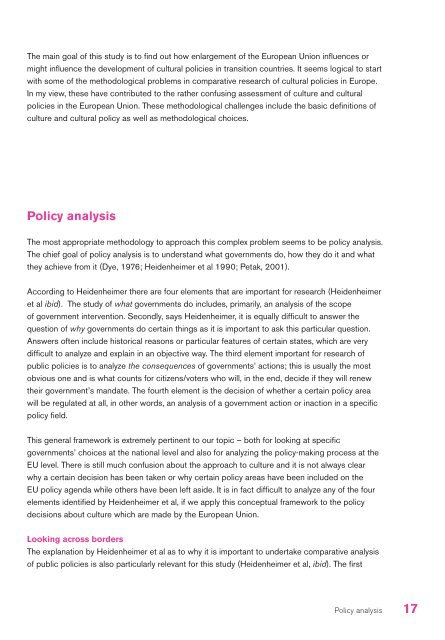Why we need European cultural policies: the impact of EU ...
Why we need European cultural policies: the impact of EU ...
Why we need European cultural policies: the impact of EU ...
You also want an ePaper? Increase the reach of your titles
YUMPU automatically turns print PDFs into web optimized ePapers that Google loves.
The main goal <strong>of</strong> this study is to find out how enlargement <strong>of</strong> <strong>the</strong> <strong>European</strong> Union influences ormight influence <strong>the</strong> development <strong>of</strong> <strong>cultural</strong> <strong>policies</strong> in transition countries. It seems logical to startwith some <strong>of</strong> <strong>the</strong> methodological problems in comparative research <strong>of</strong> <strong>cultural</strong> <strong>policies</strong> in Europe.In my view, <strong>the</strong>se have contributed to <strong>the</strong> ra<strong>the</strong>r confusing assessment <strong>of</strong> culture and <strong>cultural</strong><strong>policies</strong> in <strong>the</strong> <strong>European</strong> Union. These methodological challenges include <strong>the</strong> basic definitions <strong>of</strong>culture and <strong>cultural</strong> policy as <strong>we</strong>ll as methodological choices.Policy analysisThe most appropriate methodology to approach this complex problem seems to be policy analysis.The chief goal <strong>of</strong> policy analysis is to understand what governments do, how <strong>the</strong>y do it and what<strong>the</strong>y achieve from it (Dye, 1976; Heidenheimer et al 1990; Petak, 2001).According to Heidenheimer <strong>the</strong>re are four elements that are important for research (Heidenheimeret al ibid). The study <strong>of</strong> what governments do includes, primarily, an analysis <strong>of</strong> <strong>the</strong> scope<strong>of</strong> government intervention. Secondly, says Heidenheimer, it is equally difficult to ans<strong>we</strong>r <strong>the</strong>question <strong>of</strong> why governments do certain things as it is important to ask this particular question.Ans<strong>we</strong>rs <strong>of</strong>ten include historical reasons or particular features <strong>of</strong> certain states, which are verydifficult to analyze and explain in an objective way. The third element important for research <strong>of</strong>public <strong>policies</strong> is to analyze <strong>the</strong> consequences <strong>of</strong> governments’ actions; this is usually <strong>the</strong> mostobvious one and is what counts for citizens/voters who will, in <strong>the</strong> end, decide if <strong>the</strong>y will renew<strong>the</strong>ir government’s mandate. The fourth element is <strong>the</strong> decision <strong>of</strong> whe<strong>the</strong>r a certain policy areawill be regulated at all, in o<strong>the</strong>r words, an analysis <strong>of</strong> a government action or inaction in a specificpolicy field.This general framework is extremely pertinent to our topic – both for looking at specificgovernments’ choices at <strong>the</strong> national level and also for analyzing <strong>the</strong> policy-making process at <strong>the</strong><strong>EU</strong> level. There is still much confusion about <strong>the</strong> approach to culture and it is not always clearwhy a certain decision has been taken or why certain policy areas have been included on <strong>the</strong><strong>EU</strong> policy agenda while o<strong>the</strong>rs have been left aside. It is in fact difficult to analyze any <strong>of</strong> <strong>the</strong> fourelements identified by Heidenheimer et al, if <strong>we</strong> apply this conceptual framework to <strong>the</strong> policydecisions about culture which are made by <strong>the</strong> <strong>European</strong> Union.Looking across bordersThe explanation by Heidenheimer et al as to why it is important to undertake comparative analysis<strong>of</strong> public <strong>policies</strong> is also particularly relevant for this study (Heidenheimer et al, ibid). The firstPolicy analysis17














